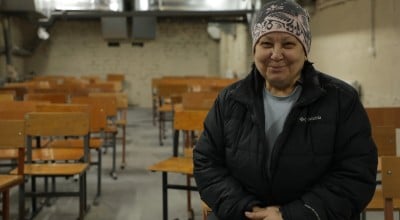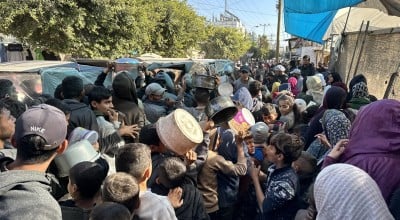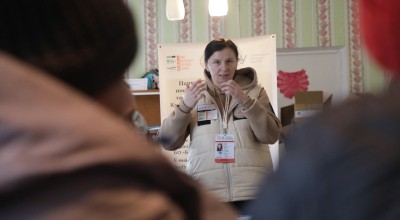
Read our 2024 annual report

Knowledge Hub
Abdi Rashid is Country Director in Somalia for Concern Worldwide. He has been with Concern for 30 years, joining in 1992 when Concern arrived in Somalia to respond the famine of 1991/92. As Somalia teeters once again on the edge of human catastrophe, we speak to Abdi about rising food prices, drought, and what it feels like to watch a child recover from malnutrition.
Thanks for talking to us Abdi! Let’s dive straight in…
In terms of rising prices which are being felt to a certain extent in Ireland as they are elsewhere, and especially fuel, and food in the light of what’s going on in Ukraine, are ordinary people feeling the effects of that yet in Somalia – are prices going up?
Absolutely, I would say that Somalia is one of the worst hit by the global trends of not only fuel, but also rising food prices there. Somalia imports its fuel from the Gulf countries, and we know that the fuel prices have been increasing in those countries for the last year or so. Additionally, Somalia imports most of its food from outside. Take wheat, for instance. 90 percent of Somalia’s wheat consumption comes – or used to come – from Russia and Ukraine. With this, and with the general increase of food prices and fuel prices, in a country where the government is too weak to support infrastructure to help to keep prices within a reasonable amount, are all factors.
Because of what is happening around the world, Somalia is in a very vulnerable position. Maybe other countries have ways to help the affected communities to keep prices manageable, but in Somalia, it is highly unlikely that anything can be done with the increasing prices of commodities. For example, sorghum is used a lot in rural areas. A 50 kg bag of sorghum is now $50, and it was $8 at the end of 2021. From $8 to $50. That is 50 kg of sorghum, which most people in rural areas depend on. Fuel too - 20 litres is costing $35 right now, whereas it was in most of the places $18 in March this year, this is only three months ago, and it is more than double.
Is there still food available in markets?
There are still a lot of imports coming in, but the question is the price of the food commodities. It is the purchasing power, the whole purchasing power of millions of people. Although you have food in the market, the ability of people in those areas to buy or get access to that food is very limited. And that’s where we come in, in providing cash so that the people can buy food from markets.
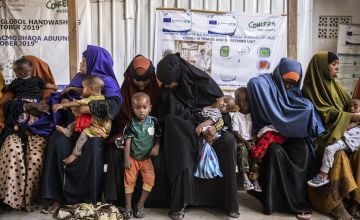
How is drought exacerbating the situation?
We have had the fourth consecutive rain failure. March, April, May and June is the main raining season in Somalia, and it failed. Some places received below-average rainfall, but the majority of places received no rain at all. Imagine a family who had lost their harvest three seasons ago, and they started using their savings, whatever they had, and then the next season also failed, and finally they were forced to flee and look for assistance in urban centres.
This is more than a normal drought when you combine with Covid-19’s impact, and the significant increase in food and fuel prices. When you combine all those, it is more than just a drought impact. You had a drought that has been slowly killing animals and then one harvest failure after the other, and this is where we are right now. Some areas could be experiencing a famine like situation in the next few months if assistance is not scaled up immediately.
How fearful are you of what the effects of famine can be?
When you see the level of malnourishment; when you have almost half of the Somalian population needing food assistance; when you see the limit of funding that is there; the displacement from rural areas to urban centres; and four consecutive years of rain failure, it would be a miracle if some the places did not declare a famine.
Moving onto Concern’s work, how do cash transfers work?
Cash transfers are done by mobile phone, so we call it Mobile Money Transfer System. We work with one of the biggest telecom companies in the country. In most places, people have mobile phones, but very few people have smart phones. Some people travel to a place where there is a signal so that they use it to buy goods from the money they receive through the mobile. Here, there is an electronic purchase system, and it’s very common. Where you have a shop, if you’re talking about a shop in Mogadishu, or a shop in a remote village in the country, they all accept those vouchers.
Presumably, for most people, the main expense would be food that people would use the cash for?
Yes, we do most distribution monitoring, and the findings indicate that people spend approximately half of the money for food, followed by water and medicine, but food is the priority number one always.
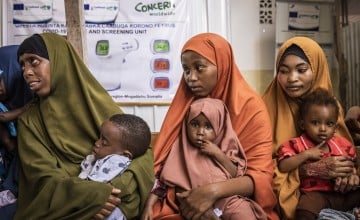
With the rising food prices, what is Concern doing to make sure that the payments can keep pace with the price rises? Have the level of payments gone up recently, or do you not have enough funds?
There is a common kind of platform that all agencies use where we monitor the prices of commodities, and that information is being shared with the UN. There is an office called FSAU, Food Security Assessment Unit, so they get all that information and on a monthly basis they produce something that’s called Minimum Expenditure Basket (MEB).
This is what we base the value of our cash transfers on. In some places, people receive 80 percent of the MEB, and in other places, they receive maybe 100 percent. There are ongoing consultations all the time, but with the money that is available and the increase of commodities, you could say that it is difficult to compensate it, given the large number of people who need assistance. Therefore, the question comes: do you give some to all, or all to some. And that’s a difficult choice.
Do you know roughly how many children are being helped with Ready to Use Therapeutic Food (RUFT)?
With the centres we are running, we’re supporting around 2600 children per month, and we anticipate this going up to 3000+ per month as we see an increase on a daily basis. Soon we could see up to 3000 children coming to the centres that we are supporting, which are in or in the surrounding areas of Mogadishu.
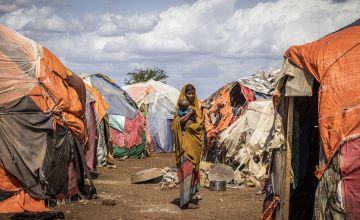
If there are other children that are not necessarily malnourished but may well still be hungry, do mothers share the Plumpy’Nut with other children?
Yes, absolutely. We think that whatever we give to this mother for the malnourished child that she will keep it for that child, but she has a bigger responsibility and has choices to make. Choices like yes this child needs it, but also this one – and if you don’t assist him now, he will also be in a similar situation as the severely malnourished child.
Sometimes the Plumpy’Nut becomes the only food available for the children, for all other children. And yes, so it happens in IDP settings when a mother decides to go and register the malnourished children at different agencies with the idea to get maybe sometimes more Plumpy’Nut for other children. However, when cash comes in, and when we prioritise the mothers with severely malnourished children with cash, that’s where it helps. She can keep that Plumpy’Nut for the severely malnourished child, and then she has something for the rest of the family.
Have you ever met any children who’ve made a good recovery because of the Plumpy’Nut, who you’ve maybe met when they were malnourished, and seen a couple of months down the line when they’re recovered? Can you share your experience of that and tell us how it makes you feel?
Seeing a child who has recovered from malnutrition is really the greatest joy and motivation to me, as someone who has been in the humanitarian sector for many, many years.
A child smiling, gaining weight - and not just at the centre but also you see the child in the the IDP camps there, and that child playing with other children, that really certainly is what has kept me going over the years, and being a humanitarian worker from the early 90s. The difference is there, it’s nothing like that first day when I saw the child, the day that they are given a screen and their case is closed, and they’re back with the rest of the family. That’s an impact really, that’s a very positive impact, and that’s when you say it has been worth doing or taking all those risks over the months to continue providing the services for those people.
If someone was considering donating to Concern’s work in Somalia, what would you say to them?
I know the people are suffering in Ukraine, but human suffering is a human suffering, whether it’s Ukraine or in Africa, or in Somalia. I think there are enough resources to assist people suffering in all corners of the world.
People’s support has made a big difference in Somalia already, whether it’s the lifesaving treatment or long term funding for a serious table of programmes there, and I can say that that generosity has saved millions of people previously.
Thank you so much Abdi Rashid!
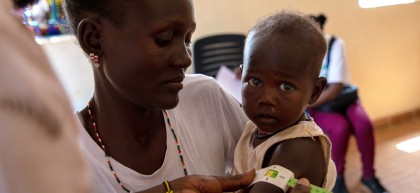
Other ways to help
Corporate support
Is your company interested in working together for a common cause?
Fundraise for Concern
From mountain trekking to marathon running, cake sales to table quizzes, there are lots of ways you can support our work.
Buy a gift
With an extensive range of alternative gifts, we have something to suit everybody.
Leave a gift in your will
Leave the world a better place with a life-changing legacy.
Volunteer with Concern
The lots of ways to get involved with our work as a volunteer
School fundraising
Without the generous support from schools, we wouldn't be able to do the work that we do.


